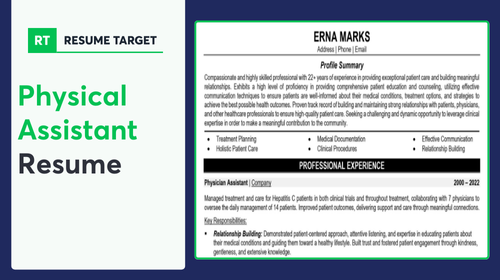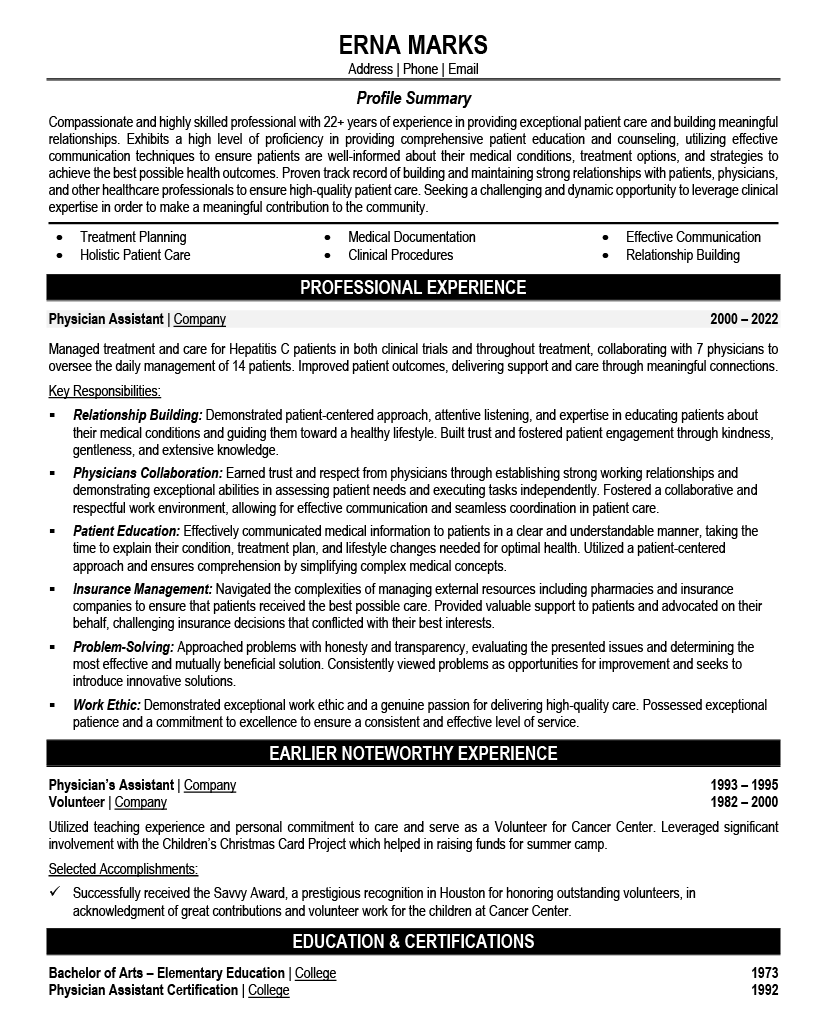

Standing out in a crowded field of PA candidates takes more than just listing your clinical rotations. Your resume needs to showcase your unique blend of medical expertise and patient care abilities.
Are you struggling to capture your full range of capabilities on paper? A strategically crafted PA resume can transform your clinical experience into compelling proof of your value to potential employers.
Resume Target specializes in helping Physician Assistants translate their complex medical skills into clear, powerful achievements. This guide will show you exactly how to create a resume that gets you noticed by hiring managers and lands more interviews.

As key players in modern healthcare delivery, Physician Assistants serve as highly skilled medical professionals who can diagnose illnesses, prescribe medications, and provide direct patient care across virtually all medical specialties.
Working independently while collaborating with healthcare teams, PAs perform comprehensive patient exams, develop treatment plans, assist in surgeries, and serve as primary healthcare providers for many patients - making them invaluable bridges between doctors and patients in today's complex medical landscape.
If you're interested in a dynamic medical career that combines clinical expertise with patient advocacy, the PA profession offers numerous pathways for growth - from specializing in fields like emergency medicine or surgery to advancing into leadership roles in healthcare administration or education.
Let's talk about what's exciting in the Physician Assistant field - your earning potential is impressive and varies based on where you choose to work! From outpatient care centers to educational settings, your skills as a PA can command competitive compensation, with opportunities to increase your earnings as you gain experience and specialize.
Figures from: U.S. Bureau of Labor Statistics
As a Physician Assistant, your career path offers diverse opportunities for growth and specialization. From clinical practice to leadership roles, you can shape your career trajectory through continuous learning and strategic advancement.
Beyond clinical expertise, advancing your PA career requires a strategic blend of leadership abilities and specialized competencies that set you apart in the healthcare field.
- Advanced Clinical Decision Making - Healthcare Technology Proficiency - Practice Management - Patient Care Coordination - Leadership and Team Management - Clinical Research Methods - Cross-specialty Medical Knowledge - Interpersonal CommunicationTo become a Physician Assistant, you'll need to complete a master's degree program, gain healthcare experience, and obtain state licensure - a journey that typically takes 6-7 years after high school.
Your path to becoming a successful PA requires mastering essential soft skills, including effective communication and the ability to explain complex medical concepts while maintaining composure in high-pressure situations.
Requirements from Mayo Clinic College of Medicine and Science
From bustling city hospitals to rural clinics, PAs are in high demand across healthcare settings nationwide.
Figures from HealtheCareers
Struggling to showcase your clinical experience, patient care skills, and medical expertise in a way that catches a hiring manager's attention? This comprehensive, section-by-section guide will walk you through creating a powerful Physician Assistant resume that highlights your qualifications and demonstrates your value to potential employers.
As a Physician Assistant, you excel at diagnosing complex medical conditions and delivering patient care, but condensing your extensive clinical expertise into a compelling resume summary can feel more challenging than a difficult case presentation.
While you've mastered the art of patient assessment and treatment planning, translating your diverse medical skills, specialty experience, and patient outcomes into a concise professional snapshot requires a different kind of precision - one that helps hiring managers quickly recognize your unique value in today's competitive healthcare landscape.
How would you describe your clinical expertise and patient care philosophy in a way that sets you apart from other Physician Assistants?
Reason: Opening with your overall approach to patient care and clinical specialization immediately establishes your professional identity and values. This helps employers understand your care delivery style and cultural fit.
What combination of medical specialties and healthcare settings have shaped your practice as a PA, and how do they benefit a potential employer?
Reason: Highlighting your diverse clinical background demonstrates adaptability and breadth of experience, while showing employers how your varied expertise can add value to their practice or institution.
How would you characterize your collaborative approach with physicians, specialists, and other healthcare team members throughout your PA career?
Reason: Emphasizing your interprofessional abilities is crucial as PAs must work effectively within healthcare teams. This shows potential employers your ability to integrate into their existing medical staff structure.
As a Physician Assistant, your resume needs to showcase both your clinical expertise and your ability to work within healthcare teams while maintaining patient-centered care.
From performing physical examinations and developing treatment plans to managing electronic health records and coordinating with specialists, your skill set must demonstrate both your medical knowledge and your practical capabilities in a clinical setting.
Showcase your clinical expertise and patient care achievements by organizing your PA experience into three powerful sections: a concise role overview highlighting your practice settings, measurable patient care achievements that demonstrate your impact, and core clinical responsibilities that spotlight your diagnostic and treatment capabilities.
Many Physician Assistants struggle to effectively showcase their dual impact on patient care quality and operational efficiency in their achievements section. Transform your clinical outcomes and workflow improvements into compelling metrics by connecting your direct patient care interventions with measurable improvements in patient satisfaction scores, reduced wait times, and enhanced practice efficiency.
The responsibilities section demonstrates how PAs contribute to patient care and medical team operations beyond basic clinical duties. This section must clearly communicate complex medical work to both healthcare recruiters and hiring managers while showing how your role supports overall patient outcomes and practice efficiency.
Your PA education and board certifications are the foundation of your clinical practice credentials. Lead with your highest degree and NCCPA certification, then include any specialty certifications or additional medical training that demonstrates your expertise in specific practice areas.
Now that you've created a strong foundation using Resume Target's comprehensive resume writing guidelines, you're ready to transform your CV into a powerful tool for landing PA positions.
While many healthcare professionals focus solely on customizing their cover letters, tailoring your Physician Assistant resume for each specific role, practice, or specialty is equally crucial for standing out in this competitive field.
A customized PA resume not only helps you navigate through ATS systems by incorporating role-specific keywords, but it also demonstrates to hiring managers how your unique clinical experience, patient care approach, and specialized skills align perfectly with their practice's needs.
Ready to turn your resume into your career's secret weapon? Let's make every application count by showing employers you're not just another PA candidate – you're their ideal next team member!
Don't let limited clinical experience hold you back from launching your Physician Assistant career!
Your PA program training, clinical rotations, and healthcare-related experiences can create a compelling story of your readiness to practice.
Focus on highlighting your clinical rotations, medical knowledge, and patient care skills as the foundation of your resume.
For more guidance on structuring your healthcare credentials, check out the Student Resume Writing Guide for examples tailored to new healthcare professionals.
Your resume summary is your chance to showcase your clinical rotations, healthcare experience, and the valuable patient care skills you've developed during your PA program.
Focus on highlighting your direct patient care experiences, specialized clinical skills, and your passion for delivering exceptional healthcare outcomes.
"Dedicated and compassionate Physician Assistant graduate with 2,000+ clinical rotation hours across multiple medical specialties including emergency medicine, family practice, and internal medicine. Demonstrated expertise in patient assessment, treatment planning, and electronic medical records (EMR) systems, with additional experience in surgical assisting and urgent care. Proven track record of building strong rapport with patients and healthcare teams while maintaining 100% accurate documentation. Seeking to leverage strong clinical foundation and patient-centered approach to provide exceptional care at [Hospital/Practice Name]."
Now's your chance to showcase the rigorous medical training and clinical rotations that prepared you for your PA career - make every detail count!
Don't just list your degree - highlight relevant coursework like Advanced Pharmacology and Clinical Medicine, plus spotlight hands-on patient care experiences from your clinical rotations that demonstrate your readiness to practice.
Common courses in Physician Assistant (PA) programs include anatomy, physiology, biochemistry, pharmacology, physical diagnosis, pathophysiology, microbiology, clinical laboratory science, behavioral science, and medical ethics [2]. Clinical rotations often cover family medicine, internal medicine, obstetrics and gynecology, pediatrics, general surgery, emergency medicine, and psychiatry [2]. For example, the George Washington University (GWU) PA program includes Clinical Assessment, Integration into Clinical Concepts, Foundations of Medicine, Evidence-Based Practice, and various clinical practicums [1].Relevant Coursework: Clinical Assessment | Physical Diagnosis | Pharmacology | Pathophysiology | Evidence-Based Practice | Clinical Laboratory Science
Key Projects:
Clinical Integration Capstone: Developed comprehensive patient care plans through clinical rotations in family medicine and emergency departments, demonstrating ability to assess, diagnose, and create treatment strategies for diverse patient populations.
Community Health Initiative: Collaborated with interdisciplinary healthcare team to design and implement preventive care program for underserved populations.
Leverage your clinical rotations, medical coursework, and hands-on patient care experience to create a compelling skills section that showcases your readiness to provide high-quality healthcare as a Physician Assistant.
As an entry-level Physician Assistant, your combination of clinical knowledge and patient care skills positions you well for a rewarding career in healthcare, where demand for qualified PAs continues to grow significantly across various medical specialties.
When you're juggling clinical responsibilities, patient care documentation, and staying current with medical protocols, crafting a resume that captures your full scope of practice can feel overwhelming.
At Resume Target, we specialize in healthcare resume writing and understand the unique challenges PAs face in today's evolving medical landscape.
Our expert writers have helped countless Physician Assistants showcase their clinical expertise, from specialized procedural skills to cross-specialty experience, resulting in interviews at top healthcare institutions.
With healthcare facilities actively recruiting PAs across multiple specialties, now is the perfect time to ensure your resume stands out - schedule your free consultation today to transform your clinical experience into a powerful career tool.
Impress any hiring manager with our Medical resume writing service. We work with all career levels and types of Medical professionals.
Learn More → Medical Resume Writing Services